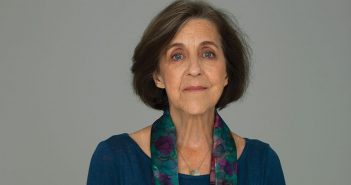This guest blog post was written by Anna Lonon, a new affiliated faculty member of our Medical Humanities Program. Stay tuned to hear more about our exciting new affiliates!
The recent July 16 webinar, “Medicine, Narrative, Pandemic & Power,” sponsored by the Modern Language Association (MLA) could not have been a more relevant and salient talk. The webinar featured Rita Charon, MD, PhD, founder of the Division of Narrative Medicine at Columbia University, and Professor of Medicine at Columbia University Medical Center, and Aakriti Pandita, fiction writer and

infectious diseases physician who, ironically, was one of the first Covid-19 patients in Rhode Island. Together, Charon and Pandita advocate for the medical humanities to create better physicians and healthcare providers; ones who are more perceptive and more committed to the ‘radical listening’ necessary to treating patients and pursuing social justice.
The power of the narrative is a central theme of the talk, and is demonstrated beautifully in Pandita’s own illness narrative, followed by Charon’s analysis of it. Pandita’s narrative comes across both relatable and horrifying, as we learn of a highly educated physician being repeatedly misdiagnosed as her symptoms worsen, eventually leaving her like “an infant again.” (She is eventually diagnosed with tuberculosis of the spine, an extremely rare condition, after self-advocating and aggressively seeking a correct diagnosis.) Although traumatic, it is this life changing event that turns Pandita to literature and writing, and, as Charon argues, ultimately makes her a better doctor who really listens to her patients. Charon recounts specific narrative structures present in Pandita’s story (like her temporal restructuring to relay the trauma associated with her illness) giving us front row access to what this type of “radical listening” looks like and how narrative theory and literary criticism can provide more perspective to a patient’s story.
Who wields power is also a central theme of the talk and Charon argues for more balance between those who have the power with those that typically do not. What is both fascinating and troubling is how someone like Pandita, a physician who obviously wields some power, is still failed by the U.S. healthcare system. Just a few years after her initial illness, Pandita again has to self-advocate for a Covid-19 diagnosis after being dismissed by multiple practitioners. A remedy to these failings, both agree, can be found in bringing narrative medicine to those in power. As Charon notes, there is a lot that we needto listen for regarding the factors that make us who we are, including our socioeconomic and  cultural backgrounds, and studying the humanities facilitates these necessary skills.
cultural backgrounds, and studying the humanities facilitates these necessary skills.
So, how do we use narrative medicine and the humanities to correct the disparities that exist in medicine? Health practitioners must commit to social justice. They must give those without agency the ability and right to be heard, and “radically” listen. Both the Division of Narrative Medicine at Columbia University and the Division of Social Medicine work to promote this. Moreover, what comes from not listening and, therefore, from not committing to social justice? Perhaps the difference between life or death. Charon and Pandita describe liver and kidney transplant recipients overrepresented in whites and underrepresented in the black community; and a much higher incidence of childbirth mortality in black women than whites across classes. Issues like this warrant more questioning, more curiosity and more listening to find the answers and get better outcomes for these patients.
For Charon and Pandita and all of us in the medical humanities, it is at the intersection of literature and medicine, of storytelling and healing, that social justice is found. When we open ourselves up to really listen to everyone’s story, and we actively explore it as we would a plot in a story, we get to the deeper meaning, the full story, and, hopefully, to complete healing.
For access to a recording of the webinar, click Here.